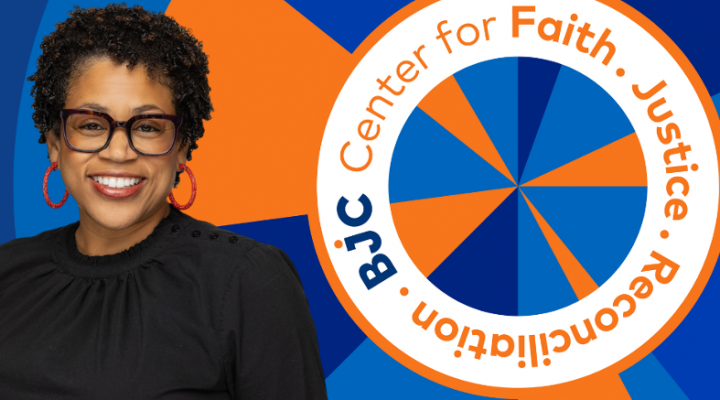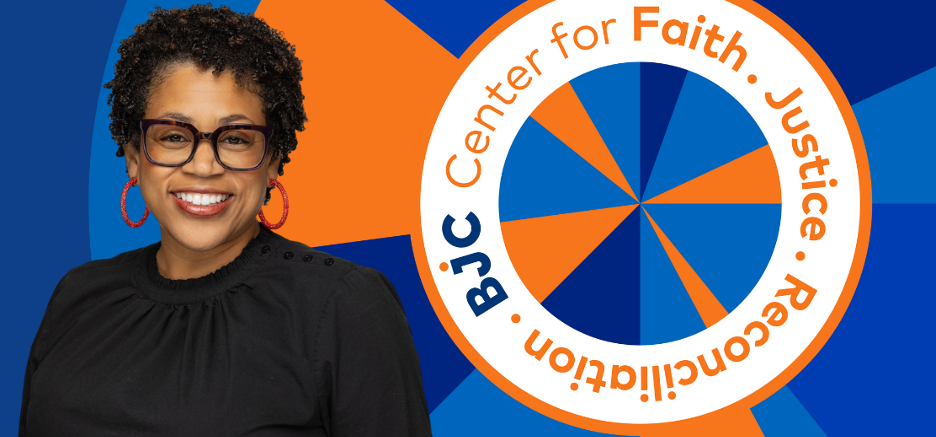Editor’s note: This is the third opinion piece in a new series on religious liberty authored by BJC Fellows and made possible by a grant from the Prichard Family Foundation.
The United States continues to be shaped by theological, political and economic stories as well as assumptions that seeded it nearly 250 years ago. These limited mainstream narratives tell us who counts as human, who speaks for truth, who defines what’s good, and how our communities should be governed. Religious freedom always has cut through these questions.
Earlier this year, I began serving as director of the BJC Center for Faith, Justice and Reconciliation. Keisha McKenzie, an advisory board member of the center who works at Auburn Seminary, shared this with me at the time: “At this fragile point in our nation’s development, with toxic politicians using religion to grasp power and influence, inclusive and pluralistic religious freedom educators and advocates have a constructive role to play.”
Since 1936, Baptist Joint Committee for Religious Liberty has worked to protect religious freedom out of the historic Baptist commitment to “soul freedom.” This perspective can only be fully realized when freedom points to full liberation.
That is, the ability for all people to live in a world where their humanity is recognized and affirmed. The struggle of advancing justice in our society requires we make intentional efforts to expand our understanding of how the limits of religious freedom for some has shaped public policies and social norms while causing harm to many communities.
BJC’s investment in the center points to an initial step in reimagining the work of protecting faith freedom for all. In the past year, the center partnered with academic, grassroots and national nonprofit organizations to raise the visibility of justice issues rooted in systemic racism, white supremacy and Christian nationalism. Simultaneously, BJC expanded its mission to engage in deep truth-telling by repairing and building relationships with Black Baptist denominations and elevating underrepresented voices in these critical discussions. This reaffirmed BJC’s commitment to addressing the problem that religious freedom has been white too long.
“This reaffirmed BJC’s commitment to addressing the problem that religious freedom has been white too long.”
In 1954, Martin Luther King Jr. preached the convicting sermon “Transformed Nonconformist.” He admonished white Christians with high and noble ideals to take risks by embodying the moral courage of Jesus to go against what is popular to do what is right.
King emphasized the work of Christians in this minority group would be an eternal challenge that called for discernment and a new mental outlook. As he framed it, “The hope of a secure and livable world lies with disciplined nonconformists who are dedicated to justice, peace and brotherhood (community).” He continued: “The great creative insights have come from (wo)men who were in a minority. It was the minority that fought for religious liberty; it was the minority that brought about the freedom of scientific research.”
This moment in our nation calls for each one of us to be transformed nonconformists in addressing racial justice and religious freedom issues in the 21st century. Under the leadership of Amanda Tyler, BJC is taking meaningful steps to decenter whiteness within the context of religious freedom.
This has manifested in tangible ways through BJC’s Project on Race and Religious Freedom and by sponsoring the center’s key education program, Religious Freedom Mobile Institute. The center reaffirms BJC’s commitment to racial justice and building a beloved community. We are using our collective agency to protect and advance faith freedom for all.
This work takes all of us — scholars, faith leaders, organizers, citizens and policymakers — dedicated to upholding ideals that create an inclusive society and democracy where all people can freely live according to their conscience.
I asked several of the BJC Center for Faith, Justice and Reconciliation advisory council members to share what this moment means to them.
“The challenges facing our society and world continue to call for audacious actions, conscious commitments and deep faith,” said Corey D.B. Walker, the center’s past president. “As the center moves into a new and exciting relationship with BJC, I know its rich heritage, bold vision and brave voice will continue to ground us in creating a beloved community for all.”
In reimagining how our faith or moral compass compels us to take action, we are called to cultivate curriculum and innovative programming where education stimulates changed hearts, behaviors, attitudes and ultimately policies and laws. The BJC Center for Faith, Justice and Reconciliation “deepens the witness of both the center and BJC academically, racially and nationally because the witness of both movements is essential ‘for such a time as this,’” said Bill J. Leonard, founding dean and professor of divinity emeritus at Wake Forest University School of Divinity.
“It was in Colonial Williamsburg that I made a personal commitment to disrupt the historical narratives about religious freedom that omitted the experiences of African Americans.”
“In contentious cultural contexts where some people seek to eradicate religious diversity, the Center for Faith, Justice and Reconciliation fearlessly empowers communities to embrace religious diversity,” said Brad R. Braxton, president at Chicago Theological Seminary. “By merging into BJC — another fearless champion of religious freedom — the center will exponentially extend its already remarkable reach and effectiveness.”
In 2015, the BJC Fellows seminar was a transformative experience that allowed me to define my truth, inhale my hopes and exhale my anxieties about the ways religion has been used to liberate some while oppressing others.
It was in Colonial Williamsburg that I made a personal commitment to disrupt the historical narratives about religious freedom that omitted the experiences of African Americans. Since that day, I have been faithful in my call to be in solidarity with underrepresented groups while making room at the table no matter what identities we hold or who we love.
This is the work of human dignity, social justice and liberation. As Martin Luther King said, “The trailblazers in human, academic, scientific and religious freedom have always been nonconformists. In any cause when it comes to the progress of (hu)mankind, put your faith in the nonconformist!”
I invite you to join us on the journey ahead as we live into our faith by unapologetically advancing faith freedom for all.
Sabrina E. Dent directs the BJC Center for Faith, Justice and Reconciliation, leading several of BJC’s educational programs and BJC’s Project on Race and Religious Freedom. She was a member of the inaugural class of BJC Fellows in 2015 and served on the BJC board of directors from 2020 to 2023. She earned a bachelor’s degree from Virginia Tech, and a master of divinity and doctor of ministry degrees from the Samuel DeWitt Proctor School of Theology at Virginia Union University.
Other articles in this series:
The stupidity of Christian nationalism | Opinion by Claire Hein Blanton
‘Thou shalt not covet thy neighbor’s wife’ and other posters I do not want in a first grade classroom | Opinion by Britt Luby


